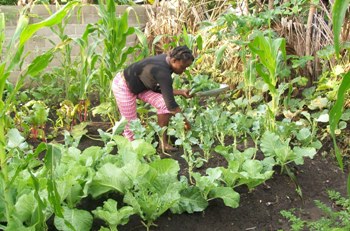Technical assistance: vital for funding and agricultural insurance

San Jose, Costa Rica, July 31, 2012 (IICA). According to representatives of a number of agencies convened by IICA to discuss ways in which those financial instruments can support the development of agriculture in Central America, technical assistance is key to the success of funding and agricultural insurance for small- and medium-scale farmers, because they will help them to increase productivity and reduce risks.
Officials from the Inter-American Development Bank (IDB), the United States Agency for International Development (USAID) and the Central American Bank for Economic Integration (CABEI) participated in an videoconference organized by the Inter-American Institute for Cooperation on Agriculture (IICA), the Executive Secretariat of the Central American Agricultural Council (CAC) and the P4P/WFP, as part of the Central American Initiative to Link Small-Scale Farmers to Markets.
David Hatch, a specialist in agricultural insurance and the IICA Representative in the United States, indicated that the strengthening of such financial instruments will require the involvement of governments and the private sector, with the former creating confidence in investors and the latter applying resources and innovative knowledge.
“Insurance must be one of the last options chosen for managing risks, which must first be understood and minimized. Then it can be transferred to the insurers, which will charge a very high premium if the risk is also high,” he explained.
He indicated that Honduras is the Central American country that has most actively promoted agricultural insurance, linking it to loans for the sector. If the other countries follow this example and act as a bloc, rather than as individual states, said Hatch, agriculture in the region will be more attractive to international insurers. In these nations, agriculture faces similar risks, such as climate change and price volatility.
Mark Werner, an IDB financial specialist, said that the success of funding and agricultural insurance schemes depends on the existence of robust extension programs, created in association with suppliers of technical assistance, and should focus on areas with agrifood potential and well-articulated value chains.
“Good practices include the long-term commitment of the financial institutions, the hiring of professionals in the field of agronomy who know about finance, partnerships to lower costs, the use of modern technology and a focus on dynamic value chains”, he said.
Angel Murillo, an agribusiness specialist with the CABEI, stated that the practice of saving, especially on the part of women, must be encouraged in Central America because it represents an opportunity to develop human and, therefore, social capital.
In the videoconference, USAID presented the “Development Credit Authority” program, which will inject US$365 millions into financial institutions in Latin America, which in turn will loan resources to small- and medium-scale farmers.
According to Ana Luisa Pinto, portfolio manager of the USAID Office for Latin America, the Caribbean and Europe, “It acts as insurance. USAID provides loan guarantees to the institutions, which then grant loans from their own resources, and draw on our funds only if there are losses.”
Representatives of the public and private sectors followed the videoconference in the IICA Offices in Central America, Belize, Panama, Dominican Republic, United States and other countries of the hemisphere.
Marcelo Nuñez, an IICA specialist in agribusiness and competitiveness, stated that there are weaknesses still to be overcome in improving the access of small-scale farmers in Central America to loans and insurance. These include the need to develop and strengthen agribusiness capabilities in their organizations (in areas such as risk management and the availability of technical and economic information for decision making), and to guarantee property rights so as to provide legal safeguards for the financial and insurance institutions.
The Central American Agricultural Council (CAC) and the P4P/WFP, as part of the Central American Initiative to Link Small-Scale Farmers to Markets, is being promoted by IICA, the Executive Secretariat of the CAC and the Purchase for Progress (P4P) initiative of the World Food Programme.
For more information, contact:
marcelo.nunez@iica.int